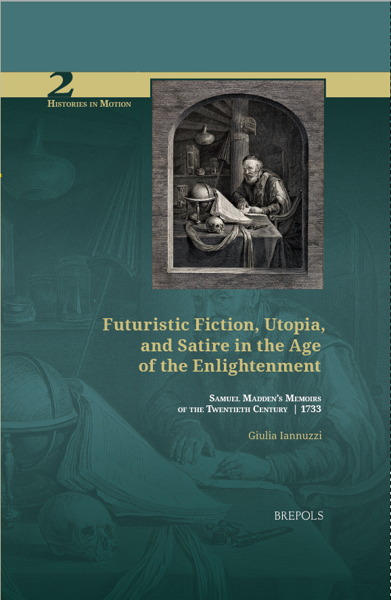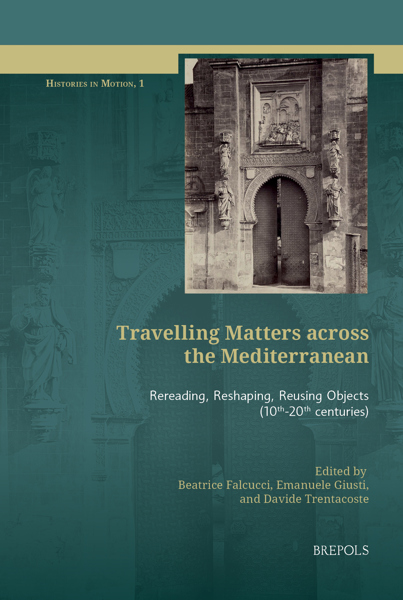
Travelling Matters across the Mediterranean
Rereading, Reshaping, Reusing Objects (10th–20th centuries)
Beatrice Falcucci, Emanuele Giusti, Davide Trentacoste (eds)
- Pages: 288 p.
- Size:156 x 234 mm
- Illustrations:9 b/w, 24 col., 2 tables b/w.
- Language(s):English
- Publication Year:2024
- € 85,00 EXCL. VAT RETAIL PRICE
- ISBN: 978-2-503-61005-4
- Hardback
- Available
- ISBN: 978-2-503-61006-1
- E-book
- Available
Focusing on how things were reshaped and repurposed, this volume explores objects and their ever-changing meanings in motion across the Mediterranean Sea in a multi-layered historical perspective.
Material artefacts are not just exemplars of connectivity. Travelling Matters across the Mediterranean shows how material objects actively shaped the space of the Mediterranean over time. Everyday things and luxuries, as well as objects of knowledge, relics and human remains travelled, were exchanged or were mobilised in court cases. In the process, they were physically reshaped and their meanings re-articulated. In this innovative and creative book, which covers the period from the Byzantine Empire to the present day, nine chapters explore the displacement and repurposing and the making and remaking of objects to rethink the temporal and spatial contours of the Mediterranean.
Prof. Giorgio Riello, European University Institut
"(...)the editors have assembled a work of significant value to historians working with material culture and scholars in the Galleries, Libraries, Archives, and Museums (GLAM) sector. The chapters engage with theories of object biography and agency, while also highlighting the stages in the lives of objects: displacement, repurposing, and the acquisition of new meanings." (Lauren Murphy, in Parergon, 42/2, 2025, p. 218)
Beatrice Falcucci is Juan de la Cierva Postdoctoral Fellow in History at Pompeu Fabra University (Barcelona), and Visiting Fellow at the Centre for the Study of Cultural Memory (SAS, London). Her research focuses on Italian colonialism, colonial culture, and its legacy in the building of the Italian character.
Emanuele Giusti is a Postdoctoral Researcher at the University of Florence. He specializes in the intellectual and material history of orientalism during the long eighteenth century, focusing particularly on the relationship between Europe and Iran.
Davide Trentacoste is a Postdoctoral Research Fellow at The Haifa Center for Mediterranean History (Israel). He specializes in the history of Mediterranean diplomacy in the early modern period, with a focus on the relations between the small Italian states and Safavid Iran.
In the last two decades, objects have become increasingly relevant to historical studies as the primary focus of research discussing cross-cultural relations. Objects are produced, used, modified, preserved, and destroyed according to historically specific political and cultural settings, thus providing researchers with information and insights about their original background. However, they can also throw light on a large array of cross-cultural encounters when their mobility is put to the fore. Objects can move by being bought, gifted, bartered, and sold, borrowed or stolen, collected and dispersed, just as they can be modified, repaired, reshaped, repurposed, and destroyed in the process.
The Mediterranean, as a barrier and as a meeting place for different polities and communities, and as the setting of conflicted experiences of cultural, political, economic, and social transformation, easily lends itself to this kind of historical analysis. Featuring articles on Byzantine imperial silks and bronze doors from southern Italy, eastern luxuries in Istanbul and African bolsas from the Canary Islands, Arabic geographies and Hebrew religious texts travelling from shore to shore and from manuscript to the press, and the ‘dead’ bodies of holy women and men, this volume intends to tackle objects as sources and subjects of the history of cross-cultural encounters in innovative ways: focusing on the ‘second-handedness’ of displaced objects across the Mediterranean, the volume intersects different chronologies — from antiquity to the present-day — and varying scales, from the individual objects to the much larger one of the histories of their reinterpretation and repurposing.
Introduction: Rereading, Reshaping, Repurposing Objects in Motion across the Mediterranean
Beatrice Falcucci, Emanuele Giusti, Davide Trentacoste
(Re)using Byzantine Textiles: Adapting and Reinventing Material Identities through the Connected Mediterranean, Seventh–Twelfth Centuries
Anna Kelley
Travelling Doors: Medieval Bronze Doors in the Mediterranean
Judith Utz
Arabic Geography and Sixteenth-Century Cartography: Guillaume Postel and the History of Abū al-Fidāʾ’s Manuscript
Maria Vittoria Comacchi
From Africa to the Canary Islands: The Double Lives of Objects (Sixteenth–Eighteenth Centuries)
Claudia Geremia
Manuscripts from Western Europe, Printer from the Land of Israel: Movement between Cultural Spaces in Hebrew Printing in the Eighteenth Century
Oded Cohen
Dazzling Objects and Ottoman Enthusiasts: Travelling Luxuries Across the Mediterranean and Beyond
Tülay Artan
‘A stone called pourcellaine’: Chinese Porcelain and Early Modern Natural History
Matthew Martin
Life and Afterlife of Religious Bodies: From Organic Matters to Devotional Objects. Corpses on Display in Late Modern Italy (c. 1800–1950)
Leonardo Rossi
The Journey of Prehistoric Remains: Re-reading the Case of Scoglio del Tonno, Taranto (1899–1950s)
Fedra Pizzato
Index

